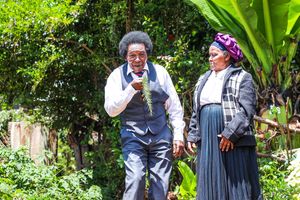
The real wedding headache? Not the cake or décor, but family drama
If you thought the headache of wedding preparations involves finding the right décor, vendors, cake tastings, fundis who ghost you at the last minute, or even chasing after the right cars, think again.
For some brides, the real heartbreak doesn’t come from event mishaps, it comes from an unexpected and deeply personal place: family.
It’s like a slap in the face when you realise just how egoistic the people you call family can be. From fighting over who should sit at the high table to scrambling for dowry envelopes, some family members make your special day about themselves. The same people who should be holding your hand through the chaos are the ones stoking fires behind your back.
It’s in those moments — when you’re wiping tears in a gown you barely got to enjoy — that you realise that not all heartbreak comes from failed love. Sometimes, it’s the people who helped raise you who shatter you the most.
Six broken chairs and a wounded heart
When MK and her husband decided to do their initial introduction ceremony (kumenya mucii and kuhanda ithigi), she was conflicted but confident that at the very least, the day would be a success.
Taking three months to plan, MK shares that during the first month, she consolidated her relatives to get them to attend the event.
“When my mum passed away, they all distanced themselves because of property fights and going against the will,” she opens up.
After overcoming that challenge, MK was confronted with the question of where the ceremony would be held.
“Two people I’m supposed to call grandfathers exchanged words and insults simply because I chose a neutral ground for the event as none of them wanted to set foot at the other’s compound. So, I chose to convene the event at my great-grandfather’s home,” she shares.
When that hurdle was solved, MK received a through-the-roof budget which was not only ridiculous but also unrealistic for the initial meetup.
“The event was only supposed to have 40 people, and the budget they shared was about Sh300,000 including my relatives’ fare. I called them and we agreed on a reasonable budget of Sh180,000 that I would cater for,” she says.

Out of marriage comes families, and families marry one another, birthing a society and security.
To her surprise, she was short changed.
“Definitely, I could not sleep there. I had travelled with my in-laws on the day of the event. When we got to Embu at around 10am, I got a call from my aunt telling me, ‘Kama hamkuji si mseme watu waende shughuli zao, si lazima tukue hapa, kazi ni mingi’ (If you’re not coming just say so that people can go back to their daily activities),” she recalls.
Shocked by the call, MK rushed to her great-grandparent’s home only to find there were not enough seats or décor — despite the budget covering all these items. Upon enquiring, MK was met with insults and rude connotations.
“When my hubby’s family got to the compound at noon, they were welcomed by neighbours. My relatives were seated at bay. The food that was served didn’t have enough salt. When they entered the house to discuss my dowry as per Kikuyu traditions, all hell broke loose. They (my relatives) started fighting about who was supposed to get the envelope,” she says.
As the exchange became heated and unpalatable, at least six chairs were broken. MK shares that she and her in-laws walked to their cars and drove off.
“I was so heartbroken. I blocked everyone and in retrospect, I do regret going there. I am slowly making peace with the fact that they will never change.”
Some relatives are not to be trusted…
When AA was getting married in August 2021, she often had to remind herself that it was her day, despite her family members trying to take over. While the planning was equally tedious and hectic, AA shares that what robbed her of more joy was the lack of support from people she is meant to call family.
“My hubby and I are from different tribes. When we met and started dating around 2016, he knew of my estranged relationship with my mother’s husband who had even chased me away from home,” she starts.
When AA’s boyfriend and his friend decided to visit her home in Dagoretti around 2018 for the first introduction, he brought shopping, but AA’s mum felt it was not enough. She recalls her mum lamenting about it to an extent AA gave her money. In retrospect, this was the beginning of her woes.
In 2020, when AA’s boyfriend’s family visited officially, she provided all the resources needed for the meetup to avoid fights with her mum on:”Wanatumia vitu vyangu na hawajalipa mahari (They are using my items and they are yet to pay dowry). They deliberated and agreed that my hubby should bring 99 goats, which at the time were Sh10,000 for one and 12 dozen of lesos, saying, “my family has so many aunts,' yet the ones I know and talk to are less than five,” she says.
While this was not in line with Luhya customs, AA chose to consult her grandfather who advised them to bring 50 cows — which at the time cost about Sh50,000 each.
“During this time, my mum was so tribal, asking me why I was siding with my husband’s people yet they don’t have mercy when asking for dowry.”
When AA got pregnant around December the same year, her husband requested permission to do the wedding first, then complete the dowry process afterwards. Although her grandfather was okay with it, AA’s mother argued against it.
“She said people from my husband’s tribe are not trustworthy and will not honour their end of the bargain. When I started preparing for the wedding, my mum never supported me in any way. In fact, she was bitter about the delayed dowry and often questioned why there was such urgency to have the wedding,” she says.

Beach wedding set-up.
Determined to achieve success on her big day, AA continued with her wedding preparations and even called her grandfather to walk her down the aisle. A week later, AA received a call from her mum: “She told me to look for an uncle as my grandfather could not walk me down the aisle as per her culture. I wondered, ‘Oh, now my culture has a voice, but during dowry negotiations you wanted to adopt another culture’ — but I ignored the thoughts and chose my favourite uncle. She (my mum) was against him because he was young and chose another uncle who could not make it.”
Her aunts, on the other hand, started suggesting that AA be walked down the aisle by her mother’s husband — and threatened not to attend if he didn’t.
“I agreed. In fact, they would have reduced my budget. When my mum saw that I was comfortable with whatever developments came my way, she suggested that my stepbrother walk me down the aisle. I was okay with it and told him to just walk beside me and not touch me at all,” she says.
A day to the wedding, AA’s in-laws were requested to bring crates of soda and lesos. She, her future mother-in-law, and her best couple went to take the items – three crates of soda and 12 lesos.
“When we arrived, the gate was locked. I kept ringing the bell but got no response. I accessed our home through the back gate and found my mum, who told me she could only open the gate after my mother-in-law gave out some cash — just like the Kikuyus do it — which she did, then left home,” she says.
Although her wedding day was devoid of drama, AA shares that tribalism is still paramount among some parents, and they frown upon marrying from a different community.

An African bride leads her groom into the compound on her traditional wedding day, flanked by dancing maidens to the cheer of the guests.
However, one thing AA wished had been done differently was getting her mother’s support. “From the type of gown I am wearing, to the theme colour, food and décor…I just wish she could have been part of the experience.”
‘I don’t want you to embarrass me.’
For AW, her wedding preparation troubles were quadrupled by her father, who asked for too much in dowry. Having done her wedding in 2023, AW says her boyfriend, who is equally young and yet to amass wealth, was pushed to the corner by her father, who wanted 10 cows, 10 goats, and a wad of cash.
“My mum passed away while I was just in Class Five, and even though dad raised me, he remarried and my mum’s co-wives were never the easiest people to live with,” she opens up.
When AW planned to officiate her relationship, her boyfriend had just graduated after self-sponsoring his education, and she was just starting her career.
“The first call I made to dad to tell him of the plans, he asked for a lot, saying he educated me to university and my then-boyfriend would solely benefit from it.”
Attempts to get him to hear her out fell on deaf ears. Every call was a reminder of how much he had invested in her — and how little he was getting in return.
“I travelled home to try to reason with him at least face-to-face, but he was unmoved, comparing me with other village girls. ‘Msichana wa Otieno alileletwa ng’ombe 10 na mbuzi 15 na msichana wake alisoma college… wewe unataka kuniletea kidogo kwa nini? Mimi sitaki aibu’ (Otieno’s daughter brought him 10 cows and 15 goats, yet she never schooled beyond college. Why do you want to bring me so little? I don’t want to be embarrassed).”

A woman looks at her wedding ring.
Additionally, AW’s father explicitly stated he could not cater for anything more. “An aonge pesa mar nyiewo gigo tee. Ka unyalo nyiewo chiemo ma ubiro chamo sach nyombo to sawa (I don’t have money to cater for all the foodstuff that will be used during dowry payment. If you and your husband-to-be can do so, then that’s okay).
Two weeks before the traditional ceremony, AW sought the help of her father’s peer, who calmed him down and got him to accept what her boyfriend could bring. She still had to shop for all the ingredients in Nairobi and travel with them to Siaya.
“When my boyfriend came home, my dad accepted the five cows, three goats, and Sh20,000 he brought as my bride price. Aside from that, he (my boyfriend) gifted every member present — about 150 people — money from as low as Sh50 for the children to Sh5,000,” she says.
AW shares that to date, her dad still harasses her, saying he is still waiting for more money.












